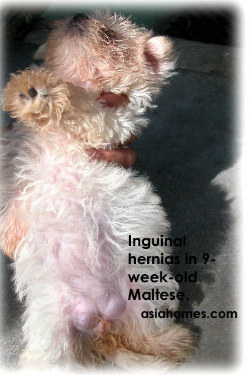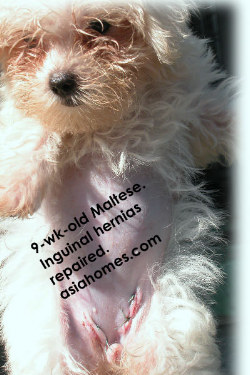How to choose a normal puppy?
Hernias -
examine the lower body carefully. Pet shop owners
and breeders should disclose the presence of hernias
to avoid misunderstandings, litigation and return
after purchase
Many
buyers do not examine thoroughly the lower part of the body and may think
that swellings in the belly or groin area are normal. They are not.
One such swelling seen in puppies is a hernia. This is uncommon but
the unfortunate new puppy owner sometimes resent being sold a non perfect
puppy.
CONGENITAL DISEASES - HERNIAS
INSPECT THE LOWER PART OF THE BODY.
Hold up the puppy under the armpits. Inspect the belly and groin areas for any
swelling beneath the skin. A hernia is a hole in the muscle layers permitting abdominal fat,
intestines and bladder to flow from the abdomen to under the skin. It
can be very painful and life-threatening to the dog if it is large.
UMBILICAL HERNIAS. A swelling is seen under the belly.
INGUINAL HERNIAS. If you see two swellings around the groin area,
they are left and right inguinal hernias (see pictures below).
ADVICE FOR BUYERS.
Do not buy the puppy with hernias, but some puppies are just too
attractive to let go. Small ones (less than 1 cm in diameter) usually do
not cause a problem. Some Sellers may agree to pay for the hernia
surgery. It is up to you to negotiate.
Hernias over 1 cm may enlarge later. You will need to spend money on
veterinary surgery.
ADVICE FOR BREEDERS.
If you wish to be a breeder, do not buy puppies or
adults with hernias.
If your vet repairs the hernia at the age of 6 - 8 weeks of age, the
puppy will still command a premium selling price when the wound has
healed 14 days after surgery.
You and your vet have to take the risk that the puppy may die on the
operating table. Puppies over 12 weeks of age are safer to
anaesthesized.
The puppy should not be kept for breeding after surgery if you want to
upgrade your breeding stock.
It is not possible to describe various congenital disease. It is best
that you get your Vet to examine the puppy after purchase as most
Sellers will take back the puppy within 1-3 days (see Sales Contract)
if it fails the veterinary inspection.
 TOA
PAYOH VETS TOA
PAYOH VETStoapayohvets.com Date: 04 March, 2010 |
|
||||||||||||||||||||
|
|||||||||||||||||||||


